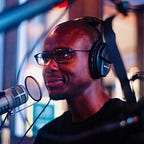It’s Not Always About Race
I read a Luke Cage review written by Noah Berlatsky for NBC News after watching several episodes of season two. The author was expecting a conversation on race which would have added to the 50–11 race conversations we hear daily. I looked him up and I understand why his expectations were more self-serving, had they been met, than the “teaching moment for all” he had hoped for. Now let me tell you about the teaching moment it actually was…
What is much more at play here than racism is ‘ethnocentrism.’ Definitions for the 112-year-old noun range from Merriam-Webster’s “the attitude that one’s own group, ethnicity, or nationality is superior to others” to Wikipedia’s “is judging another culture solely by the values and standards of one’s own culture.” No matter the race, you either hold ethnocentric prejudices toward those who look like you but are from a different country or have made ethnocentric jokes “in fun.” We’re all guilty.
I claim two ethnicities, American and Trinidadian. I have black friends who represent each region of the African Diaspora, some also with direct roots to two countries and others with just one. I’m here to tell you it ain’t a communal kumbuya within the Diaspora. I recently had a conversation with a Black American friend about how in New York City, a place I once lived and still frequent, the enthusiasm for and support of communities and celebrations that are ‘Black’ but not ‘American’ are greater than that of Black Americans. I’ve also had a Black Jamaican-American friend say she’s not completely sold on living in Harlem because it appears as if Africans are taking over. “Keep Harlem black…the way it should be. Southern black. I ain’t talkin’ ‘bout no cigar-smokin’ black, ganja-smokin’ black. ‘Black’ black.” — “Cockroach” (Dorian Missick) says to Mariah Dillard (Alfre Woodard) in episode one during a meeting about a gun deal. This statement, along with many others made throughout this season, rings true of underlying tensions that still exist among the various ethnic groups within not only New York City’s black population, but the black population in general.
The blaxploitation vibe of the series exaggerates the hell out of most of the tropes seen and heard. I appreciate the writers including African spirituality as part of the storyline, but just as I thought after watching Black Panther, I know most people unfamiliar with the tradition will see it as spooky black magic especially because it was used for evil. Nonetheless, if you dial all that back, you’ll recognize there was a very important narrative about Black ethnocentricism on display. One that is rarely discussed. I don’t expect ethnocentrism to disappear because cultural differences act as both unique selling points and broad lines in the sand. The line between pride and prejudice, however, is quite fine. One day, I’ll speak on how another community I’m part of ain’t a communal kumbuya either.
Geronimo Knows is an urban culture + lifestyle enthusiast, reformed blogger turned full-time interviewer. He hosts the lifestyle and travel series Cool|Calm|Connected, now playing on AllTheFlyKids.com. You can also hear him on The All the Fly Kids Show podcast, airing Mondays at 1pm on Full Service Radio at The LINE Hotel in Washington, DC. Learn more about Geronimo at geronimoknows.com.
